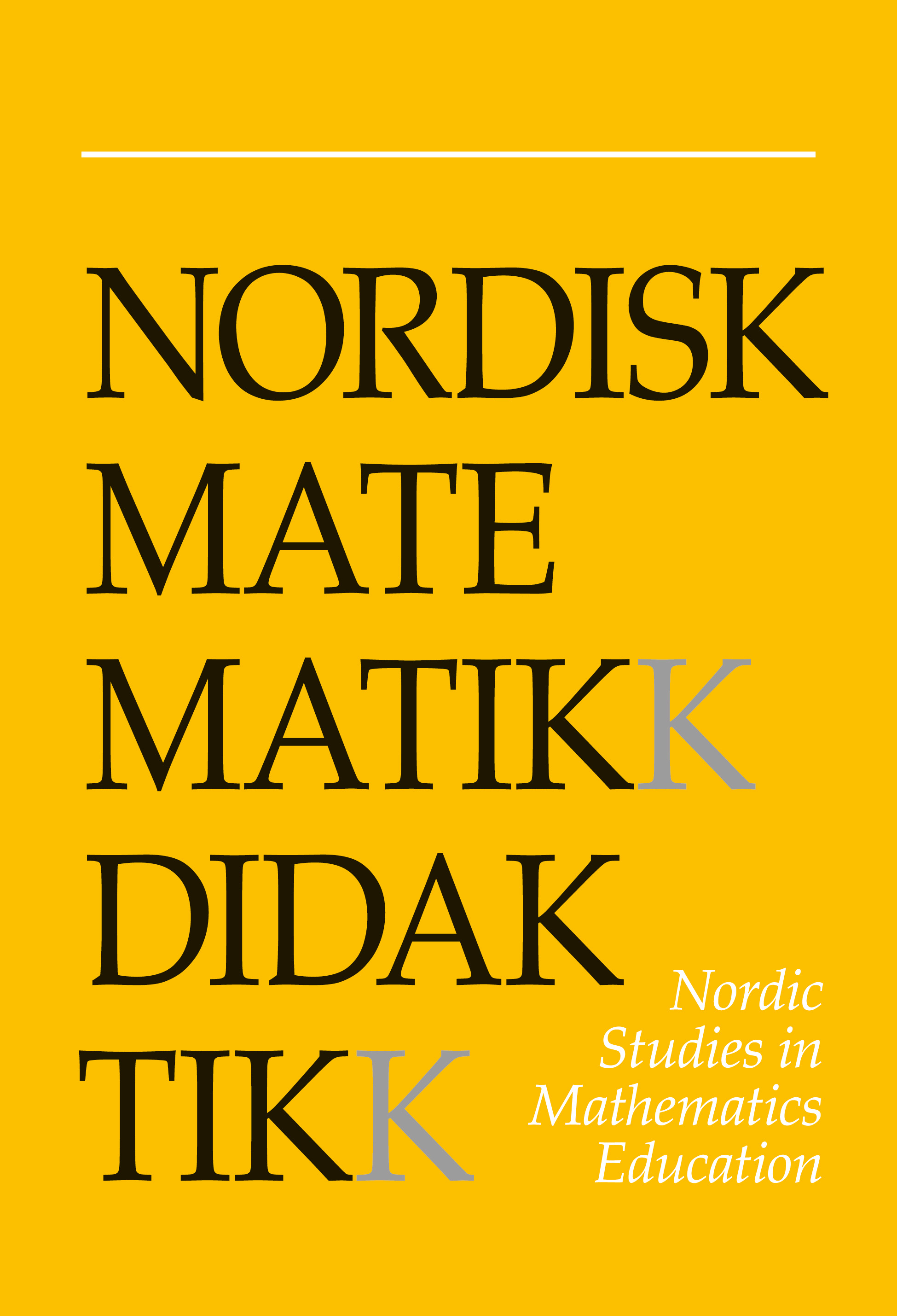Nordic school mathematics revisited – on the introduction and functionality of New Math
DOI:
https://doi.org/10.7146/nomad.v21i1.148718Abstract
We investigate the functionality of New Math in order to nuance and deepen our understanding of the process to introduce New Math in Sweden. Our main material is data and statistics from an intervention study conducted during the preparation of the New Math reform in Sweden. In particular we investigate the claim that New Math material had negative effects on students’ learning. Our conclusion is that the claim is, in most parts, incorrect.
References
Amit, M. & Fried, M. N. (2008). The Complexities of change: aspects of reform and reform research in mathematics education. In L. English (Ed.), Handbook of international research in mathematics education (2nd Edition) (pp. 385-414). New York: Routledge
Bjarnadóttir, K. (2014), History of teaching arithmetic. In A. Karp & G. Schubring (Eds.), Handbook on the history of mathematics education (pp. 431- 458). New York: Springer. https://doi.org/10.1007/978-1-4614-9155-2_21
Damerow, P. & Westbury, I. (1984). Conclusions drawn from the experiences of the new mathematics movement. In P. Damerow, M. E. Dunkley, B. F. Nebres & B. Werry (Eds.), Mathematics for all: problems of cultural selectivity and unequal distribution of mathematical education and future perspectives on mathematics teaching for the majority (Science and Technology Education Document Series No. 20, pp. 22-25). Paris: UNESCO.
Davison, D. M. & Mitchell, J. E. (2008), How is mathematics education philosophy reflected in the math wars? The Mathematics Enthusiast, 5 (1), article 15. https://doi.org/10.54870/1551-3440.1092
De Bock, D. & Vanpaemel, G. (2015), Modern mathematics at the 1959 OEEC seminar at Royaumont. In K. Bjarnadóttir, F. Furinghetti, J. Prytz & G. Schubring (Eds.), "Dig where you stand" 3. Proceedings of the third International Conference on the History of Mathematics Education (pp. 151- 168). Uppsala University.
Hattie, J. (2009). Visible learning: a synthesis of over 800 meta-analyses relating to achievement. London: Routledge.
Henricson, S. (1987). Skolöverstyrelsens provverksamhet: en översikt 1965-1985 (The testing enterprise of the National Board of Education: a survey 1965- 1985). Stockholm: Skolöverstyrelsen.
Kilborn, W., Lundberg, S., Selander, S. & Öhlund, U. (1977). Hej Läroplan!: hur man bestämmer vad våra barn ska lära sig i matematik (Hello Curriculum!: how to decide what our children should learn in mathematics). Mölndal: Pedagogiska institutionen, Göteborgs universitet.
Kilpatrick, J. (2012). The new math as an international phenomenon. ZDM: the international journal on mathematics education, 44 (4), 563-571. https://doi.org/10.1007/s11858-012-0393-2
Kline, M. (1973). Why Johnny can't add: the failure of the new math. New York: St. Martin's Press.
Kristiansson, M. (1979). Matematikkunskaper Lgr 62, Lgr 69 (Knowledge in mathematics in the curricula of 1962 and 1969) (Ph. D thesis). Göteborgs universitet.
Lindström, S. (1968). Överteoretisering av den elementära matematik- undervisningen: en kritisk granskning av förslaget ill studieplan i matematik för grundskolans låg- och mellanstadium (Over-theorization of elementary mathematics instruction: a critical review of the proposed mathematics syllabus for primary school grade 1-3 and 4-6). Stockholm: Almqvist & Wiksell.
Nordiska kommittén för modernisering av matematikundervisningen (1967). Nordisk skolmatematik (Nordic school mathematics). Stockholm: Nordiska rådet.
Phillips, C. J. (2015). The new math: a political history. Chicago: The University of Chicago Press.
Prytz, J. (2015), Swedish mathematics curricula, 1850-2014. An overview. In K. Bjarnadóttir, F. Furinghetti, J. Prytz & G. Schubring (Eds.), "Dig where you stand" 3. Proceedings of the third International Conference on the History of Mathematics Education (pp. 309-326). Uppsala University.
Unenge, J. (1978). Mathematics in an undifferentiated school system. In F. Swetz (Ed.), Socialist mathematics eucation (pp. 209-255). Southampton: Burgundy Press.
Unenge, J. (1999). Skolmatematiken i går, i dag och i morgon - med mina ögon sett (School mathematics: yesterday, today and tomorrow - in my opinion). Stockholm: Natur och kultur.
Westbury, I. (1980). Change and stability in the curriculum: an overview of the questions (Research reports from the Curiculum Laboratory, College of Education, University of Ilinois at Urbana-Champaign, Number 6). Retrieved from http://files.eric.ed.gov/fulltext/ED196706.pdf
Westin, H. (1999). Farväl standardprov: standardproven i matematik 1973- 1997 för åk 9: jämförelse av resultat på uppgifter som återkommit genom åren (Farewell standardized testing: standardized tests in mathematics 1973- 1997 for grade 9: comparison of results on items reoccurring over the years). Stockholm: Lärarhögskolan, PRIM-gruppen.
Downloads
Published
How to Cite
Issue
Section
License

This work is licensed under a Creative Commons Attribution-NonCommercial-ShareAlike 4.0 International License.



